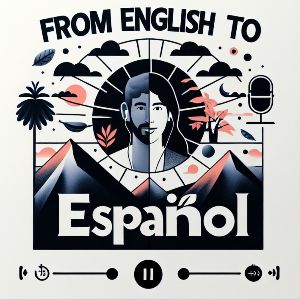Mastering Indefinite Expressions in Spanish: A Comprehensive Guide
April 03, 2025Categories: Spanish Language Learning, Lesson


From English to Español: Bridging the Grammar Gap with Alberto Rodriquez
Welcome to "From English to Español: Bridging the Grammar Gap", the podcast created specifically for English speakers ready to take their Spanish skills to the next level. Each episode dives into the core differences and surprising similarities between English and Spanish grammar, unraveling the complexities of the language in a way that’s clear, practical, and easy to follow. We'll break down essential concepts like verb conjugations, gendered nouns, and the tricky subjunctive mood, offering insights and tips that simplify these new rules and help you avoid common pitfalls. By comparing Spanish structures directly with English, you’ll quickly understand how to adapt what you already know into accurate, natural Spanish. Whether you’re a beginner or looking to brush up on advanced topics, this podcast is your comprehensive guide for bridging the gap between English and Spanish grammar, so you can speak and write with confidence. Join us daily for a new rule or concept, complete with practical examples, exercises, and memorable explanations that make learning Spanish engaging and enjoyable. Perfect for self-learners, students, and anyone serious about mastering Spanish grammar, "From English to Español" is your go-to resource for building fluency from the ground up.
Understanding Indefinite Expressions in Spanish: "Algo," "Alguien," and "Algún"
Learning Spanish involves grasping various grammatical components, and among these, indefinite expressions form a crucial part. Indefinite expressions such as "algo," "alguien," and "algún" are commonly used to refer to non-specific entities in Spanish. As learners, understanding the nuances of these terms and recognizing the exceptions to their usage can significantly enhance your comprehension and fluency in Spanish.
Let's start by breaking down these expressions:
- Algo: This term translates to "something" in English and is used to refer to an unspecified object or idea. It is gender-neutral and singular, so it does not require agreement in gender or number.
Example: ¿Quieres algo de beber? (Do you want something to drink?)
- Alguien: This term means "someone" or "somebody" and is used to reference an unspecified person. Similar to "algo," it is invariable, meaning it does not change according to gender or number.
Example: ¿Hay alguien en casa? (Is there someone at home?)
- Algún: Unlike "algo" and "alguien," "algún" functions differently as it is an adjective that requires agreement with the noun in both gender and number. This means it will change form according to the noun it modifies.
Examples:
- ¿Tienes algún libro interesante? (Do you have any interesting book?) - Here, "algún" agrees with the masculine singular noun "libro."
- Conozco alguna tienda buena en esta ciudad. (I know some good store in this city.) - Here, "alguna" agrees with the feminine singular noun "tienda."
- ¿Has probado algunos platos típicos? (Have you tried any typical dishes?) - Here, "algunos" agrees with the masculine plural noun "platos."
Exceptions and Special Uses
While the rules above outline the basic usage of "algo," "alguien," and "algún," there are instances where the context might alter their expected use:
- Euros y euros: In some regional dialects, particularly in poetry or casual conversations, "algo" and "alguien" might be preceded by articles to emphasize or specify their reference. However, this is not standard grammatical practice.
- Negative Sentences: In negative sentences, these expressions can sometimes change depending on the specific discourse. For example, No había nadie que pudiera ayudar. (There was no one who could help.) Here, "nadie," a negative expression, replaces "alguien."
Understanding these rules and exceptions can greatly assist you in using these expressions accurately in conversations and writing. Practice with different contexts can solidify your grasp over these concepts.
For more engaging learning resources, learn more at ScienceBasedLearning.com.
Ready to enhance your Spanish language skills further? Get Your Copy of our comprehensive guide on Spanish learning.